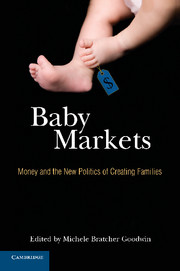Book contents
- Frontmatter
- Contents
- Preface
- Acknowledgments
- Introduction
- PART ONE WHAT MAKES A MARKET? EFFICIENCY, ACCOUNTABILITY, AND RELIABILITY OR GETTING THE BABIES WE WANT
- PART TWO SPACE AND PLACE: REPRODUCING AND REFRAMING SOCIAL NORMS OF RACE, CLASS, GENDER, AND OTHERNESS
- PART THREE SPECTRUMS AND DISCOURSES: RIGHTS, REGULATIONS, AND CHOICE
- 10 Reproducing Dreams
- 11 Why Do Parents Have Rights?: The Problem of Kinship in Liberal Thought
- 12 Free Markets, Free Choice?: A Market Approach to Reproductive Rights
- 13 Commerce and Regulation in the Assisted Reproduction Industry
- 14 Ethics within Markets or a Market for Ethics?: Can Disclosure of Sperm Donor Identity Be Effectively Mandated?
- PART FOUR THE ETHICS OF BABY AND EMBRYO MARKETS
- PART FIVE TENUOUS GROUNDS AND BABY TABOOS
- Author Bios
- Index
- References
11 - Why Do Parents Have Rights?: The Problem of Kinship in Liberal Thought
Published online by Cambridge University Press: 05 August 2012
- Frontmatter
- Contents
- Preface
- Acknowledgments
- Introduction
- PART ONE WHAT MAKES A MARKET? EFFICIENCY, ACCOUNTABILITY, AND RELIABILITY OR GETTING THE BABIES WE WANT
- PART TWO SPACE AND PLACE: REPRODUCING AND REFRAMING SOCIAL NORMS OF RACE, CLASS, GENDER, AND OTHERNESS
- PART THREE SPECTRUMS AND DISCOURSES: RIGHTS, REGULATIONS, AND CHOICE
- 10 Reproducing Dreams
- 11 Why Do Parents Have Rights?: The Problem of Kinship in Liberal Thought
- 12 Free Markets, Free Choice?: A Market Approach to Reproductive Rights
- 13 Commerce and Regulation in the Assisted Reproduction Industry
- 14 Ethics within Markets or a Market for Ethics?: Can Disclosure of Sperm Donor Identity Be Effectively Mandated?
- PART FOUR THE ETHICS OF BABY AND EMBRYO MARKETS
- PART FIVE TENUOUS GROUNDS AND BABY TABOOS
- Author Bios
- Index
- References
Summary
Let us begin with a thought experiment: a nineteen-year-old single, pregnant, black high school dropout walks into a government hospital in Harlem to deliver a baby. After the birth, a married, black, college-educated couple from Scarsdale shows up, offering to claim the baby and raise it as their own. To whom will the government hospital hand over the baby?
Under current law, the answer is, of course, clear: the unmarried teenage high school dropout who gave birth is the mother and gets to keep her baby. But why? After all, we live in an era in which the very idea of parental rights is viewed with increasing disfavor and in which mere biology is viewed with suspicion as a source of legal parenthood. The canon of family law declares that we no longer accept the discredited idea that biology gives parents rights over their children, which is described as viewing children as chattel. “The best interests of the child” are supposed to trump parental rights grounded in “mere biology.”
Certainly the answer cannot be in the best interests of this particular child. Everything we know from social science evidence – about the importance of class, resources, family structure, and the success of adoption – points in the opposite direction. If the child's best interests are the dominating criterion, this baby would be materially, emotionally, and educationally better off if raised by two affluent, educated, married parents in Westchester than by one poor, single mother in Harlem.
- Type
- Chapter
- Information
- Baby MarketsMoney and the New Politics of Creating Families, pp. 164 - 176Publisher: Cambridge University PressPrint publication year: 2010
References
- 3
- Cited by



